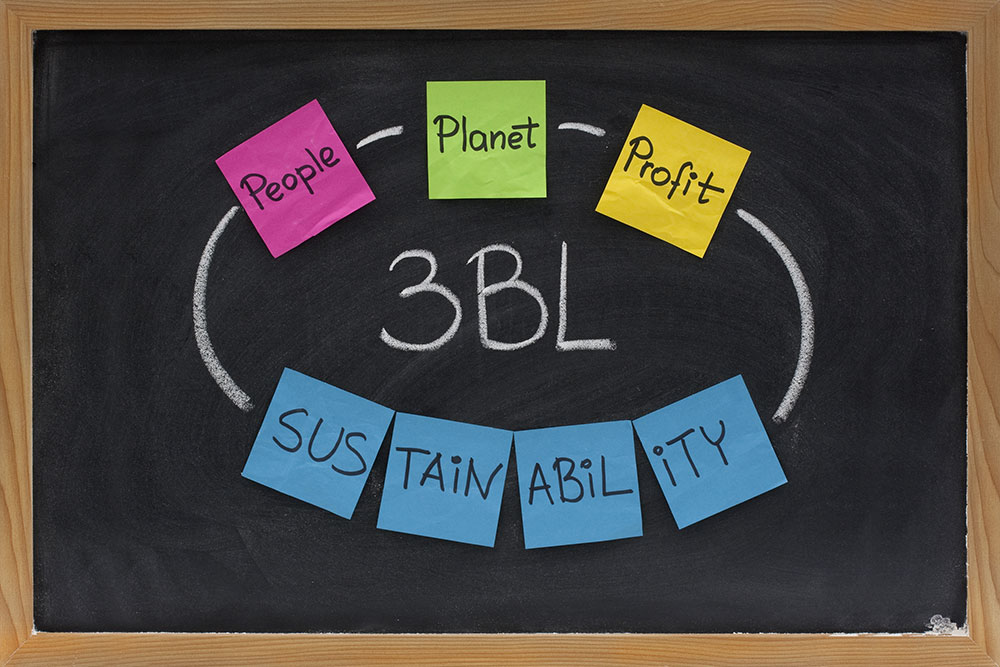
Corporate social responsibility (CSR) is doing better business.
For the cynics, it’s a way to grow market share, retain staff and attract new investment.
For everyone else, it’s running a company with more than profit in mind. (But if you do it right, you can still increase revenue.)
And CSR is more important than ever. Unchecked capitalism has weakened communities, shredded consumer trust and scarred the environment, leaving younger generations exhausted with business as usual.
If you’re a business leader or live on the same planet as the rest of us, incorporating CSR into your organisation’s culture could make a difference. Our guide explains how you can get started.
What Counts as Corporate Social Responsibility?
Every organisation needs to exist within a functioning society to survive. A business needs educated staff and working infrastructure to succeed, not to mention a healthy consumer base with enough disposable income to spend on its products and services. And a planet that can support life.
So, what is corporate social responsibility? It’s giving back and operating in a way that lifts communities, respects the environment and promotes fairness.
Yes, taxes exist to pay towards critical public services and initiatives. Still, there’s a long history of corporations taking more out of society than they’ve put in. And this brash attitude is usually the hallmark of a traditional company driven only by profit – aka the bottom line.

Organisations that adopt CSR strive for more than the extraction of wealth and find purpose in people and the planet, as well as profit. Together, these three motivators are referred to as the triple bottom line.
The Triple Bottom Line
Business leaders that follow the triple bottom line measure and manage their organisation’s impact against three metrics:
- People – supporting customers and communities around the business, as well as its staff
- Planet – ensuring operations are sustainable at a minimum
- Profit – earning revenue to grow as a business
That final point is essential. Embracing CSR is not eschewing profitability and many organisations have boosted revenue by integrating social responsibility into their operations.
The triple bottom line is CSR at its broadest and leaves room for interpretation. Decisions about what matters and what can be realistically changed are up to business leaders, with initiatives usually falling into four types of corporate social responsibility.
Environmental
Sustainability is an obvious place to start. Economic activity has accelerated climate change and inflicted extreme harm on the natural world. Basic CSR prevents this damage. Some responsible organisations go further and support regenerative practices.
Ethical
Treating stakeholders fairly. Ethical treatment covers many issues, from pay and work conditions to workplace diversity, but looking beyond your employees is essential. Consider everyone affected by your organisation, including your supply chain and other entities you work with.
Philanthropic
Supporting charities and other non-profits. Your contributions don’t need to be exclusively financial. Expertise or business advice can be invaluable for non-profits trying to maximise their reach. You can also lend your workforce for volunteering.

Economic
Weighing financial decisions against moral concerns. You are entitled to make a profit and succeed as a company but this cannot be at the cost of people or the planet.
HR Compliance Courses
Prevent conflict, misconduct and discrimination. Online HR compliance training helps staff understand and fulfil their legal duties. Promote professionalism and support compliance in your workplace.
Is CSR a Legal Requirement?
We’re bombarded with tasks from many different places – emails, phone calls, supervisors, work management tools and good old-fashioned in-trays, to name a few.
Adopting CSR is voluntary, which is kind of the point. If every business were obliged to follow CSR principles, the world would undoubtedly be better but socially responsible organisations couldn’t differentiate themselves. Distinguishing your organisation from less ethical competitors is the primary benefit. (More on this later).
Although CSR is self-regulated, you can join existing schemes or earn third-party accreditation. Following an established framework like the UN’s 17 Sustainable Development Goals helps you channel good intentions into tangible outcomes.
Independent approval proves your commitment. One widely recognised accreditation is B Corp certification, which verifies your organisation is a force for good. This confirmation can go far with stakeholders, maximising the business benefits.
What are the Benefits of Corporate Social Responsibility?
CSR is a road to good standing. Organisations that embed social responsibility into their culture and operations look better than their competitors.
In business terms, this means:
Attracting Customers
Consumer attitudes are changing. People are more socially liberal, concerned about sustainability and repelled by questionable business practices. Embracing CSR hits all these points and paints your products and services positively. You can win more customers and earn their loyalty.
Retaining Staff
What matters to your customers matters to your staff, too. Younger workers born between 1997 and 2012 (known as Gen Z) expect fairer, more diverse workplaces and action on climate change from their employers. And since Gen Z will make up about a quarter of the UK workforce by 2025, adopting CSR now puts you in an excellent position to attract and retain talent.
Impressing Investors
Investors are more interested in organisations with a growing loyal customer base. CSR is also sound risk management. Investing in a firm with a solid moral reputation and track record for doing good is safer.
How do You Demonstrate Corporate Social Responsibility?
There’s no single way to do CSR right. Your organisation’s new vision will depend on your business location, sector and size. CSR schemes should also mean something to you and your teams.
Stakeholders recognise that when an organisation is chasing trends, any benefits you might get will be short-lived. The fallout from any insincere attempts could even hurt your firm. A few principles help define realistic, popular and beneficial CSR initiatives:
- Listen to others – Involve all company stakeholders in CSR decision-making
- Make sense – Match CSR efforts to your company’s positioning
- Be transparent – Keep stakeholders informed and publish corporate social responsibility reports
- Commit – Don’t treat CSR as a marketing tool. Companies that fake it pay the price.
Make it Part of Your Company’s Culture
Employees won’t action what they don’t understand. Involving staff from the beginning of your CSR plans helps develop buy-in, but you must keep employees updated. Training helps with this.
Our online HR Compliance courses go beyond legal requirements and let you create a fairer, greener and kinder company culture. You can improve environmental performance and integrate sustainability into your business. Or you can choose courses related to employee health, safety and wellbeing – all of which prove your commitment to staff.
Other courses can raise ethical standards across your operations, covering corruption or conflict resolution issues. Duration and cost vary, but every course is online and helps create a sense of moral satisfaction.





















